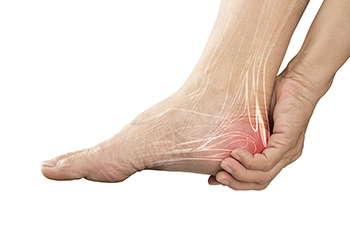
Research has indicated there is a large percentage of Americans that are considered to be obese. This condition is known to increase the risk of many physical ailments, including heel pain and plantar fasciitis. It can happen as a result of the added impact the feet endure from completing daily activities, and this may possibly damage the plantar fascia. This is defined as the band of tissue that runs along the bottom of the foot, and connects the heels to the toes. Walking can become difficult, and heel pain may increase. Partial relief may be found when a low-impact exercise routine is frequently followed. This type of exercise can include swimming, water aerobics or cycling, and some patients can feel the benefits of practicing yoga and Pilates as part of their exercise regime. This, along with eating foods that are healthy, are often effective ways to lose weight, which may relieve some of the pressure on the plantar fascia. If you have any type of foot pain, and feel your weight may be a contributing factor, please speak with a podiatrist who can treat foot conditions, and offer additional solutions for weight loss.
Obesity has become very problematic at this point in time and can have extremely negative effects on the feet. If you’re an obese individual and are concerned about your feet, contact one of our podiatrists from The Podiatry Center, PC. Our doctors can provide the care you need to keep you pain-free and on your feet.
Obesity and Your Feet
Since your feet are what support your entire weight when standing, any additional weight can result in pain and swelling. Being overweight is one of the main contributors to foot complications.
Problems & Complications
Extra Weight – Even putting on just a few extra pounds could create serious complications for your feet. As your weight increases, your balance and body will shift, creating new stresses on your feet. This uneven weight distribution can cause pain, even while doing the simplest tasks, such as walking.
Diabetes – People who are overweight are at serious risk of developing type-2 diabetes, which has a drastic impact on the health of your feet. As you get older, your diabetes might worsen, which could lead to loss of feeling in your feet, sores, and bruises. You could also become more prone to various infections.
Plantar fasciitis – Pressure and stress that is placed on muscles, joints, and tendons can trigger plantar fasciitis, which is an inflammation of tissue that forms along the bottom of the foot.
If you have any questions please feel free to contact our office located in Millburn, NJ . We offer the newest diagnostic and treatment technologies for all your foot and ankle needs.
